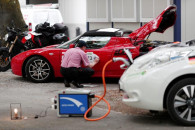City grapples with climate crisis
Experts expect results of steps to improve environment in over a decade

Meteorological officials say heavy rains often lash the region in the last days of monsoon season and more rainfall has been recorded during September in previous years than the recent spell.
The data of the Meteorological Department, shows that August was the fourth warmest month of the year in Lahore with the maximum temperature recorded at 35 and minimum at 26 degrees Celsius. The average temperature during the month was 30.4 degrees.
The maximum temperature in September is 35 degrees and minimum 24. Various parts of the city have recorded an average of 73mm of rainfall so far during the ongoing month.
According to the experts, the maximum temperature in Lahore in August next year is likely to be 37.07 degrees and minimum 26.01 degrees. The forecast of the average temperature during the month is 29.7 degrees.
They said while speaking to The Express Tribune that in view of the fact that air pollution was the major cause of climate change, the government was making efforts to prevent increase in it through the Billion Tree Project, the use of Eurofuel and other measures.
Read ‘Pakistan fifth most affected state by climate change’
According to environmentalists, the main causes of climate change are deforestation, rising levels of carbon dioxide in the atmosphere, population growth, industrial and vehicle smoke emissions, and gases from air conditioners and refrigerators.
Replying to a question, Punjab Environment Protection Director Naseemur Rehman said climate change had become a global issue. The measures taken to combat climate change in Pakistan include the Billion Tree Project, conversion of brick kilns to zigzag design, use of the Euro 5 standard fuel and the CFC technology in air conditioners and refrigerators.
The official said Euro-standard engines are being used in vehicles, which is gradually reducing the effects of toxic fumes emitted from vehicles. The use of Eurofuel in large vehicles is similar in benefit to the use of CNG in small ones.
Naseemur Rehman said steps are being taken to avoid the effects of climate change around the world, including in Pakistan, as a result of which the holes forming in the ozone layer have begun to slow down but the process of improvement would take many years.
He said the CFC technology is being used in Pakistan at present but the HCFC technology had to be adopted by 2040. The official expressed confidence that the measures would result in improvement in the environment in the next 10 to 15 years.
Another environmentalist, Dr Naeem Murtaza, said climate change is a reality that that no country can deny. The presence of carbon in the atmosphere has reached about 419 parts per million, while the figure was not more than 300 to 350 in the history. The temperature of the earth has increased by one degree in past years.
He said the recent forest fires in the US, Australia and Turkey, floods in China, storms in oceans and the locust attack in Pakistan and India last year were evident results of climate change and the destruction caused by the events was witnessed by everyone.
Read more Experts urge use of biotech to counter climate change
The expert said the world was facing a climate change emergency, to deal with which all countries, whether developed or developing, would have to fulfill their responsibilities.
Pakistan is one of the 10 countries most affected by climate change. The country's carbon emissions have increased by 123% since 1994 with greenhouse gas emissions rising every year.
A World Bank report has warned that if Pakistan does not take urgent steps to address the effects of climate change, its areas will become unfit for living by 2030. The expert said Pakistan needs to focus on implementing plans for reduction in greenhouse gas emissions.
The government is reportedly taking steps to reduce greenhouse gas emissions by 20% by 2030. Increasing the forest cover by 25% can reduce the impact of carbon by up to 40%.
According to experts, there is an urgent need to create awareness about the negative effects of climate change on Pakistan's socio-economic conditions as well as the environment.
Published in The Express Tribune, September 20th, 2021.


















COMMENTS
Comments are moderated and generally will be posted if they are on-topic and not abusive.
For more information, please see our Comments FAQ